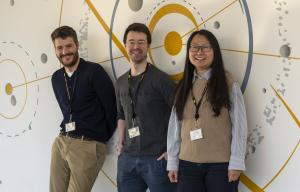Contributing to critical science
During a conversation in December, the Fellows reported that the best part of the Monaco-ITER Postdoctoral Fellowship experience was being involved in cutting-edge plasma physics research with some of the top specialists in the field and having the opportunity to present research work to the international community. Deeply immersed in their individual projects, however, the process of looking for their next positions —whether in academia or the private sector—will necessarily occupy some of the year ahead. "If there is one thing that young fusion professionals look for, after a decade of itinerancy, is to find stability in an institute, organization, or private sector company," they agreed.
The four Monaco-ITER Postdoctoral Fellows are currently advancing research in the Science Division on topics that will be critical to the updated ITER Research Plan.
Xue Bai, from China, is interested in a plasma's response to intrinsic and applied 3D fields. Her work to model and optimize the 3D fields applied by the ITER ELM control coils and error field correction coils will contribute to the effective application of the ELM control schemes in ITER while minimizing detrimental effects on plasma performance. (ELMs, or Edge Localized Modes, are energetic bursts of energy and particles that escape from the magnetic field surrounding the plasma and cause a loss of energy.)
Guillaume Brochard, from France, studies the physics of energetic particles with a particular focus on turbulence and MHD (magnetohydrodynamic) instabilities. Burning plasmas on the scale of ITER have never been observed before; Guillaume works on developing realistic energetic particle distributions in ITER plasmas and uses specific codes to analyze the stability and nonlinear evolutions of plasma scenarios that are part of the ITER Research Plan to improve non-inductive heating and fusion performance by reducing anomalous transport.
Ekaterina Matveeva, from Russia, focuses on experimental studies of disruptions in tokamaks. At ITER, she is contributing to the physics basis of the ITER disruption mitigation system by analyzing and assessing experimental data received from various tokamaks around the world that perform shattered pellet injection experiments. (Shattered pellet injection is a technique that pre-empts plasma disruptions by releasing a spray of frozen deuterium-neon pellets into a plasma.)
Guillermo Suárez López, from Spain, specializes in ion cyclotron radiofrequency (ICRF) heating, MHD theory and transport in fusion plasmas. He is performing integrated transport simulations at ITER and contributing to the development of a high-fidelity plasma simulator, with the aim of making more accurate estimations and enhancements of ITER's plasma performance.
The principal motivation of the Monaco-ITER fellowships is to develop excellence in fusion science and technology research and to contribute to forming the fusion workforce of the future. Under the terms of a Partnership Arrangement signed between the ITER Organization and the Principality in 2008, and renewed in 2018 for 10 years, Monaco funds up to five fellowships every two years for two-year terms.
The recruitment campaign for 2024-2026 Monaco Fellows launched on 15 January 2024. See all information in this article.


